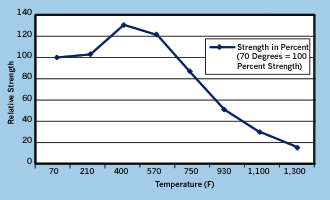I am just amazed at how much bad science and ignorance gets pored into current 9/11 conspiracy theories. For example, someone apparently did a small bit of research and found that structural steel melts at a higher temperature than aviation fuel burns. From these two facts, each correct in the right context, comes the whole theory that the WTC towers came down in a controlled demolition rather than a collapse of fire-weakened structural members. Of course, this is stupid.
I did piping and boiler design for several years at a refinery. Carbon steel, while it may not actually melt until you get it up to thousands of degrees, loses most of its structural strength between 700 and 1000 degrees(F), well below the temperatures in the WTC fires. I lived with this frustrating fact every day, since many refinery processes crave higher temperatures. Not only does steel's strength drop with higher temperatures, but it falls exponentially once it passes a certain threshold. Some day soon I will post my refinery fire pictures, and show huge steel I-beam structures that collapsed from the heat of petroleum fires. But here is a good reality check: If skyscraper I-beams really won't fail at jet-fuel-fire temperatures, why do skyscraper builders waste millions of dollars insulating all the structural steel against building fires, which I can assure you burn much cooler than aviation fuel fires?
Beyond the basic science, most 9/11 conspiracy theories violate a couple of smell-tests. The first and most obvious is Occam's razor. Any theory that uses as a starting point a few small, minor uncertainties in events and explains these uncertainties with theories that have new, massive uncertainties in them is not necessarily wrong, but one has to treat it with huge dollops of skepticism. As Jesse Walker described 9/11 cospiracy folks in Reason's Hit and Run, "They're the sort of people who will question whether a plane actually
hit the Pentagon on September 11, 2001, but won't question a theory
that can't explain just where the hijacked aircraft landed instead."
The other smell-test I use is a law I have dubbed Coyote's Law, and it goes like this:
When the same set of facts can be explained equally well by
- A massive conspiracy coordinated without a single leak between hundreds or even thousands of people -OR -
- Sustained stupidity, confusion and/or incompetence
Assume stupidity.
Does anyone really believe that a Bush administration that can't keep a program involving a dozen people secret could keep the lid on a conspiracy this massive involving hundreds of people from any number of government agencies? Isn't incompetence a more compelling answer here?
Alexander Cockburn thinks so, as quoted in Reason's Hit and Run:
One characteristic of the nuts is that they have a devout, albeit
preposterous belief in American efficiency, thus many of them start
with the racist premise that "Arabs in caves" weren't capable of the
mission. They believe that military systems work the way Pentagon press
flacks and aerospace salesmen say they should work. They believe that
at 8.14 am, when AA flight 11 switched off its radio and transponder,
an FAA flight controller should have called the National Military
Command center and NORAD. They believe, citing reverently (this is from
high priest Griffin) "the US Air Force's own website," that an F-15
could have intercepted AA flight 11 "by 8.24, and certainly no later
than 8.30."
They appear to have read no military history, which is too bad
because if they did they'd know that minutely planned operations -- let
alone responses to an unprecedented emergency -- screw up with
monotonous regularity, by reason of stupidity, cowardice, venality,
weather and all the other whims of providence....
August Bebel said anti-Semitism is the socialism of the fools. These
days the 9/11 conspiracy fever threatens to become the "socialism" of
the left, and the passe-partout of many libertarians.
By the way, can anyone tell me why the so called "reality-based" community, that so often criticizes the Right for theocratic attacks on science, is so quick to fall for this pseudo-scientific junk?
Update: In case anyone cares, here is the temperature curve for the strength of carbon steel.

Update 2: I am told by email that I will now be added to the long and growing list of those who are part of the conspiracy. Cool! Please make sure the CIA spells my name right on my payoff check.
Update3: And don't miss James Meigs here.
In every single case, we found that the
very facts used by conspiracy theorists to support their fantasies are
mistaken, misunderstood or deliberately falsified.
Here's one
example: Meyssan and hundreds of Web sites cite an eyewitness who said
the craft that hit the Pentagon looked "like a cruise missile with
wings." Here's what that witness, a Washington, D.C., broadcaster named
Mike Walter, actually told CNN: "I looked out my window and I
saw this plane, this jet, an American Airlines jet, coming. And I
thought, 'This doesn't add up. It's really low.' And I saw it. I mean,
it was like a cruise missile with wings. It went right there and
slammed right into the Pentagon."
We talked to Walter and,
like so many of the experts and witnesses widely quoted by conspiracy
theorists, he told us he is heartsick to see the way his words have
been twisted: "I struggle with the fact that my comments will forever
be taken out of context."
